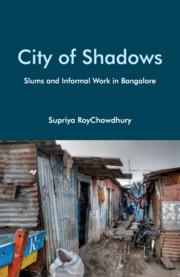Book contents
- Frontmatter
- Contents
- List of Tables
- Acknowledgements
- 1 Introduction
- 2 Welfare and Work: State Autonomy Revisited
- 3 Urban Poverty and Informal Work
- 4 A Political Economy Overview: Karnataka and Bangalore
- 5 New Slums: Migration, Livelihoods and Living
- 6 Old Slums
- 7 Impact of Slum Housing Policies: Bangalore’s New Ghettoes
- 8 Women Workers in Bangalore’s Garment Export Companies
- 9 Conclusion
- Index
3 - Urban Poverty and Informal Work
Published online by Cambridge University Press: 31 July 2021
- Frontmatter
- Contents
- List of Tables
- Acknowledgements
- 1 Introduction
- 2 Welfare and Work: State Autonomy Revisited
- 3 Urban Poverty and Informal Work
- 4 A Political Economy Overview: Karnataka and Bangalore
- 5 New Slums: Migration, Livelihoods and Living
- 6 Old Slums
- 7 Impact of Slum Housing Policies: Bangalore’s New Ghettoes
- 8 Women Workers in Bangalore’s Garment Export Companies
- 9 Conclusion
- Index
Summary
Poverty of cities and the phrase ‘urbanisation of poverty’ has drawn much recent scholarly and policy attention. The overall consensus and a shared concern seem to be that rural poverty is declining significantly, while the pace of reduction of urban poverty is slower. Beyond this broad consensus, however, the literature shows that there are very different approaches to understanding urban poverty. International policy agencies have mostly seen urban poverty as a spillover of rural poverty, caused by the process of migration of the rural poor. On the other hand, particularly in the Indian case, scholars have argued, on the basis of migration data, that the poorest do not migrate, and on this view, the roots of urban poverty lie in the structure of the urban and industrial political economy rather than in the poverty of migrants.
This political economy framework of analysis rests on three important dimensions of the urban context in India: first, the narrowness of urbanisation, as the number of small towns and cities, their developmental trajectories as well as their potential as providers of industrial employment remain stunted due to lack of policy attention; second, the absence of structural transformation in the economy, as large numbers remain tied to agriculture (disproportionate to agriculture's declining share in GDP) primarily because of lack of growth of jobs in the manufacturing sector; and third, work available to the unskilled or semi-skilled urban workforce, whether migrant or non-migrant, is in the informal sectors of manufacturing, construction, lower rungs of the services or in self-employment. Marked by low and irregular wages and income as well as lack of job security and social insurance, informal work underpins the poverty of large numbers of urban workers. In this context, some scholars have emphasised that state-sponsored social insurance can be an instrument of inclusion of poor informal workers into higher levels of access to health, education and other services, thus presenting formality–informality as a continuum, rather than as a binary. Contrarily, others have seen informality as structured exclusion, a result of globally competitive, high-technology production and services, naturally excluding the unskilled and underprivileged. The following sections provide information on some broad features of the Indian economy framed by the debates on migration, employment and informality.
- Type
- Chapter
- Information
- City of ShadowsSlums and Informal Work in Bangalore, pp. 42 - 65Publisher: Cambridge University PressPrint publication year: 2021



